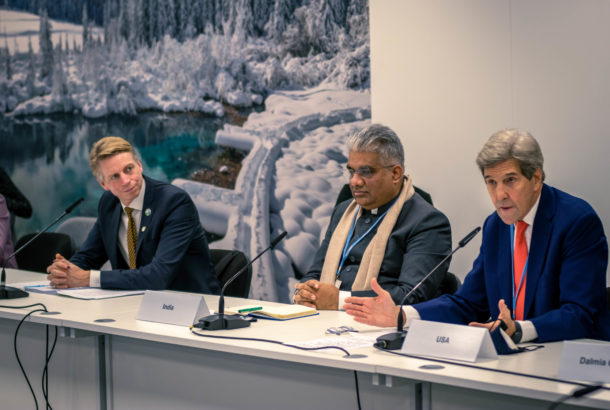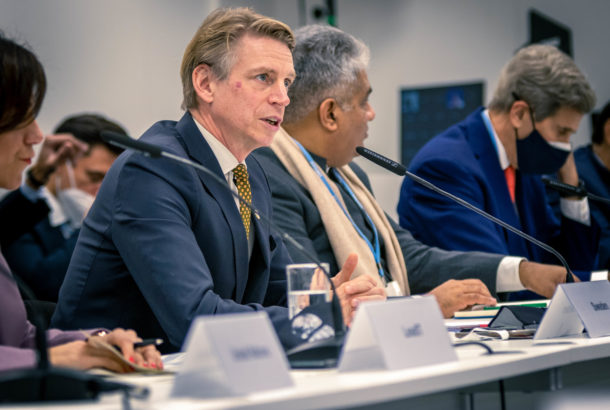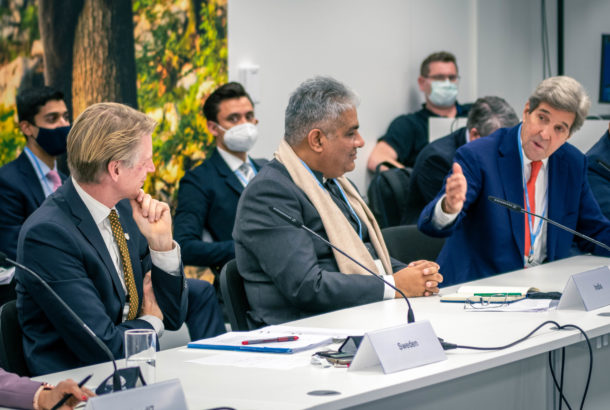LeadIT Summit and Summit Statement: ‘The time for implementation is here’.
GLASGOW – Ministers and CEOs have agreed to sharply reduce emissions from heavy industry sectors, such as steel and cement, within years, not decades, with the aim of reaching net-zero by 2050.
“The time for implementation is here,” the Leadership Group for Industry Transition (LeadIT) said in a statement at the end of its summit at COP26 in Glasgow. “The latest science sets out how urgent the situation is… Our message is simple: deep reductions in carbon dioxide (CO2) and other greenhouse gas emissions must occur throughout all heavy industries and value chains in the coming decade.”
Read the Summit Statement
Read the full Statement
At the meeting, the group’s members collectively agreed to:
- create or update country-level implementation plans, including credible interim targets, to reach net-zero emissions; and
- the ‘Finance Principles for Industry Transition’, with the goal of increasing the number and size of decarbonization projects in heavy industry, in developed and developing economies
In addition, the group committed to new collaborations on hydrogen, material circularity, carbon capture, usage and sequestration (CCUS) and other key infrastructures needed to accelerate the industry transition.
LeadIT was launched by Sweden and India at the UN Climate Action Summit in New York in 2019. Its 35 members, 16 countries and 19 companies, come from all continents and work together with the goal of reaching net-zero emissions in industry. The countries included in the leadership group make up over a third of the world economy.
“We are committed to taking action to implement an industry transition that tackles the climate crisis, creates decent and green jobs, ensures gender equality, maintains competitiveness and delivers prosperity and sustainable development for all in accordance with the 2030 Agenda,” they concluded in the Summit Statement.
‘Together we are powerful’
The statement capped an intense two-hour discussion among government ministers, CEOs and other top public- and private-sector leaders, starting with officials from the LeadIT founders: India and Sweden.
Bhupender Yadav, India’s Minister of Environment, Forest and Climate Change, stressed the importance of finance for developing countries as well as technology transfer – including access to breakthrough hydrogen technologies, carbon capture and storage (CCS) and clean energy.
Mahendra Singhi, CEO of Dalmia Cement, echoed that call. “We are fully committed to make net zero cement by 2030,” he said – but developing countries need support. “The technologies are available, but green finance will be required in developing countries” – and perhaps also a global “technology bank” that all can access. The First Movers Coalition, a group of industry leaders committed to creating lead markets for net-zero industrial products, could also play a key role, he said.

"We are committed to taking action to implement an industry transition that tackles the climate crisis, creates decent and green jobs, ensures gender equality, maintains competitiveness and delivers prosperity and sustainable development for all in accordance with the 2030 Agenda"
LeadIT members in the Summit Statement
Per Bolund, Deputy Prime Minister and Minister for Environment and Climate for Sweden, said the industrial transition “is already happening”, driven by enabling policies and investments, combined with major technological leaps: “What we see now are positive tipping points for the industry sectors that were thought of as too hard to handle.”
Collaborative platforms such as LeadIT are crucial in reaching these tipping points, Bolund added: “Together we are powerful, and things happen when we work together.” Lena Hök, Executive Vice President for Sustainability and Innovation at Skanska, highlighted the importance of partnerships between companies and governments “that want to spearhead the change”. It is critical to scale up solutions, she said, and policy-makers need to use the power of public procurement to speed up shift. “Together we have know-how to support the transition.”
“What we see now are positive tipping points for the industry sectors that were thought of as too hard to handle”
Per Bolund
Deputy Prime Minister and Minister for Environment and Climate for Sweden
Realigning incentives and public spending
John Kerry, the U.S. Special Presidential Envoy for Climate, emphasized the need to change policies to stop encouraging polluting and high-emitting industrial practices. “It’s insanity – and the craziest part is we are encouraging it,” Kerry said. “Nations are still busy subsidizing industries causing the problem, including my government.” That needs to stop, he said, and instead, it is crucial to make major green investments “to turbocharge the funding for new clean technologies.”

Martin Pei, Executive Vice President and Chief Technology Officer of the Swedish steelmaker SSAB, said companies take high risks when they choose to be frontrunners in the transition, so policy support is key. “Carbon emissions need to cost more,” he said, to speed up the transition. Several other corporate speakers – from Volvo, Scania, Vattenfall, Holcim and LKAB, among others, also called for a clear international carbon price and highlighted the importance of making sure that infrastructure, such as grid capacity, vehicle charging and electricity storage, was updated and built quickly enough.
Thomas Schulz, CEO of FLSmidth, a major Danish company that provides industrial technologies to the cement and mining sectors, highlighted the role of public procurement. FLSmidth is committed to deliver technologies for net-zero production by 2030, he said, but more work is needed to build demand – for instance, through major infrastructure projects.
From vision to action: What next?
Selwin Hart, Special Adviser to the UN Secretary-General on Climate Action and Assistant Secretary-General for the UN Climate Action Team, told participants that he was “impressed by the level of progress that has been made” – then challenged them to do more “We need deep decarbonization now, and we need clear signals from governments.”
“This COP collectively needs to accelerate progress towards a decarbonized economy,” he said. The world is currently “way off” the path to keeping temperatures from rising by more than 1.5°C, so “every action matters.” That means governments need to send clear signals through ambitious nationally determined contributions (NDCs) and strong incentives to decarbonize. Companies and civil society need to be part of the effort, and all need to work together to ensure a just transition with decent jobs.
"Carbon emissions need to cost more"
Martin Pei
Executive Vice President and Chief Technology Officer of SSAB
The need for a more ambitious timeline and an inclusive and just transition was echoed by Helen Watts, Senior Director of Global Partnerships at Student Energy, a youth-led organization that presented recommendations on the industry transition drawn from a global survey of 42 000 young people.
Selwin Hart added that more developing countries need to join the LeadIT initiative: “We cannot make this change without the developing world.”
“Count on the UN Secretary-General’s support,” he concluded. “We need you and are here to help you. Live up to your name as a leadership group.”
“We need you and are here to help you. Live up to your name as a leadership group"
Selwin Hart
Special Adviser to the UN Secretary-General on Climate Action and Assistant Secretary-General for the UN Climate Action Team
